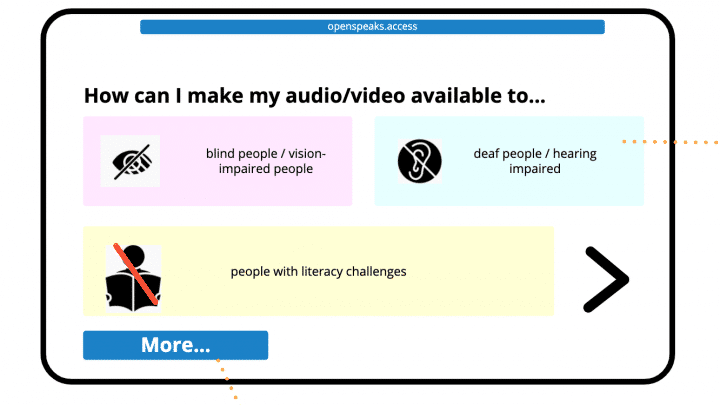Indigenous, endangered and many other languages with low resources often face a survival threat of going out of use. The amount of effort to document such languages is low because of many practical challenges, but also, because of the lack of simple, clear and open educational resources.
We are building a key component of the OpenSpeaks, a low-resource language documentation toolkit, so that archivists can ensure that their audio/video documentations can be accessed by people with certain disabilities.
Where we are coming from
Language is not only a tool for communications for the members of a community or tribe, but also a form of identity, and a political tool for citizen mobilization to ensure sustenance of human rights. Since the time UNESCO predicted that half of the world’s 6,500 languages might go extinct in a century’s time, many languages have lost their last living speakers. Of many things, languages going out of use puts the very basic rights of the native speakers, to access and disseminate information in their own language, in jeopardy.
By and large, most such endangered and indigenous languages are spoken by a smaller number of people and/or by people that are adversely affected by economic, political and environmental inequity. Because of these issues, availability of any kind of documentation (oral in the form of audio or video, or text for written languages) of such languages are relatively low.
As we started working on during the UNLOCK Sprint 1, we realized quite early on that the overall availability of resources (human, financial, technical and others) are extremely low for many languages.
Our learning curve
By the time we built our first prototype and tested with a few individuals who are involved in language documentation in different capacities, we heard about the practical challenges more and more:
We also realized that open educations resources such as OpenSpeaks in its current form can be overwhelming for new and intermediate archivists. We learned that most archivists use their own advantages to volunteer their time for language documentation which is extremely hard in developing economies. Any kind of more_than_usual technical knowhow (or the lack of it) can make things harder for archivists.
Recording myself for making instructional grammar videos in my language is hard, especially because I am doing everything from a phone. It took months and quite a learning curve to figure out a workflow that works for me.
Community activist from India
Where we are going from here
By the time we went to the second sprint of the UNLOCK Accelerator, we were very clear that we needed to bid farewell to our first prototype as it did not serve the purpose of providing tailored information in small chunks and in an interactive manner.
Our focus shifted from designing a toolkit component for accessible audiovisual documentation of languages to reflecting the needs of archivists that are in different stages of their expertise. There are many forms of disabilities and creating solutions for all might be important. But any archivist who has very limited time needs a framework to figure out for themselves where they can start from and how they can move ahead.
Our second prototype, which will be eventually available as a part of the OpenSpeaks on Wikiversity will address this very issue, and will help an archivist to build one accessible feature in their audio or video at a time.


